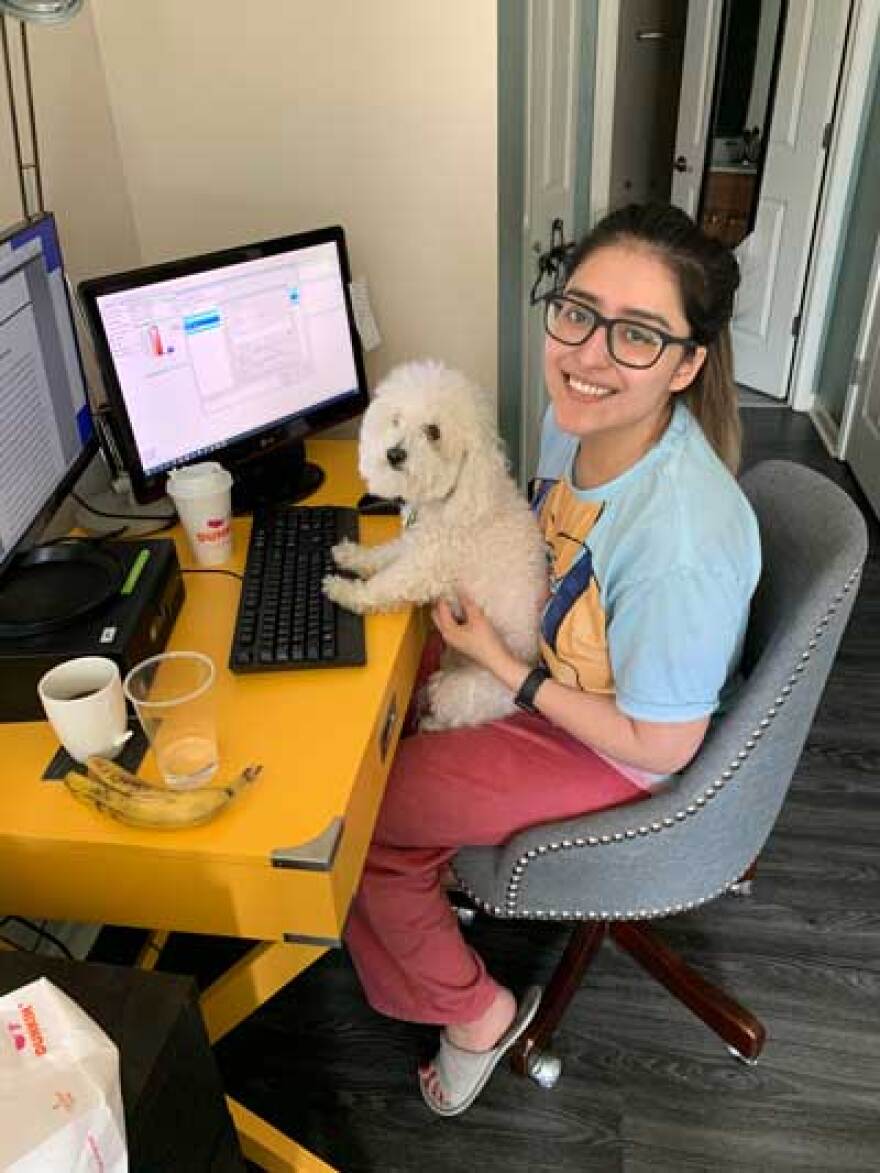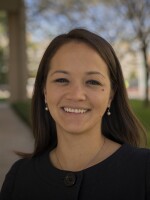Prior to the COVID-19 pandemic, 28-year-old Mayra Ramirez was working as a paralegal for an immigration law firm in Chicago. She enjoyed walking her dogs and running 5K races.
Ramirez has a condition requiring medication that could’ve suppressed her immune system but was otherwise healthy. When the Illinois governor issued a shelter-in-place order in March, she began working from home, hardly leaving the house. So she has no idea how she contracted COVID-19.
In April, she started experiencing chronic spasms, diarrhea, loss of taste and smell and a slight fever.

“I felt very fatigued,” Ramirez says. “I wasn’t able to walk long distances without falling over. And that's when I decided to go into the emergency room.”
What she thought would be a short stay led to a months-long hospitalization in the intensive care unit. Her lungs were so severely damaged that Ramirez was unlikely to survive, even after clearing the virus from her system.
As a last resort, on June 5, her doctors at Northwestern Memorial Hospital performed a rare double-lung transplant that gave Ramirez a second chance at life. She became the first known COVID-19 patient in the U.S. to undergo the procedure.
Since that time, she has been steadily regaining function but has a long road to recovery ahead.
On the brink of death
When Ramirez arrived at the emergency room in late April, she says staff checked her vitals and found her oxygen levels were extremely low. She was given ten minutes to explain her situation to her mother in North Carolina and appoint her to make medical decisions on her behalf.
Ramirez knew she was about to be placed on a ventilator, but she didn’t understand exactly what that meant.
“In Spanish the word ventilator -- ventilador -- is fan, so I thought, ‘Oh, they're just gonna blow some air into me and I'll be okay. Maybe have a three day stay, and then I'll be right out.’ So I wasn't very worried,” Ramirez says.
In fact, she would spend the next six weeks heavily sedated and on a ventilator and another life-support machine -- known as ECMO or extracorporeal membrane oxygenation -- which pumped and oxygenated her blood outside of her body.
Ramirez says while in the ICU, she had terrifying nightmares that she couldn’t distinguish from reality.
“Most of them involve me drowning,” she says. “I attribute that to me not being able to breathe, and struggling to breathe. I had way worse nightmares than that, but I don't wish to share those because they're very explicit.”

By early June, Ramirez was at risk of further decline. She began showing signs that her kidneys and liver were starting to fail, with no improvement in her lung function. Her family was told she might not make it through the night, so her mother and sisters caught the first flight from North Carolina to Chicago to say goodbye.
When they arrived, the doctors told her mother, Nohemi Romero, that there was one last thing they could try.
Ramirez was a candidate for a double-lung transplant that could save her life, they said, although the procedure had never been done on a COVID-19 patient in the U.S. Her mother agreed, and within 48 hours of being listed for transplant, a donor was found and the procedure was done on June 5.
At a recent press conference held by Northwestern Memorial Hospital, Romero shared in Spanish that there are no words to describe the pain of not being by her daughter’s side as she struggled for her life.
She thanked God all went well, and for giving her the strength to make it through.
‘I just felt like a vegetable’
Dr. Ankit Bharat, Northwestern Medicine’s chief of thoracic surgery, performed the 10-hour procedure.
“Most patients are quite sick going into lung transplant,” Bharat said in an interview in June. “But she was so sick. In fact, I can say without hesitation, the sickest patient I ever transplanted.”
Bharat says most COVID-19 patients will not be candidates for transplants because of their age and other health conditions that decrease the likelihood of success. And early research shows that up to half of COVID patients on ventilators survive the illness and are likely to recover on their own.
But for some, like Ramirez, Bharat says a transplant can be a life-saving option of last resort.

When Ramirez woke up after the operation, she was disoriented, could barely move her body and couldn’t speak.
“I just felt like a vegetable. It was frustrating, but at the time I didn’t have the cognitive ability to process what was going on,” Ramirez says.
She recalls being sad that her mother wasn’t with her in the hospital, not understanding that visitors weren’t allowed due to the pandemic.
Her family had sent photos to post by her hospital bed, and Ramirez says she couldn’t recognize anyone in the pictures.
“I was actually sort of upset about it, (thinking), ‘Who are these strangers and why are their pictures in my room?” Ramirez says. “It was weeks later, actually, that I took a second look and realized, ‘Hey, that’s my grandmother. That’s my mom and my siblings. And that’s me.”
After a few weeks, Ramirez says she finally understood what happened to her. When COVID-19 restrictions loosened at the hospital, her mother was finally able to visit.
“The first thing I did was just tear up,” Ramirez says. “I was overjoyed to see her.”
The long road to recovery
After weeks of inpatient rehabilitation, Ramirez was discharged home. She’s now receiving in-home nursing assistance as well as physical and occupational therapy, and she’s working on finding a psychologist.
Ramirez eagerly looks forward to being able to spend more time with her family, her boyfriend and her dogs and serving the immigrant community through her legal work.

But for now, her days are consumed by rehab. Her doctors say it will be at least a year before she can function independently and be active like she once was.
Ramirez is slowly regaining strength and learning how to breathe with her new lungs.
She takes 17 prescription medicines, some of them several times a day, including medicines to prevent her body from rejecting the new lungs. She also takes anxiety meds and antidepressants to help her cope with daily nightmares and panic attacks.
“Slowly but surely, I'm able to get through them with the help of therapy,” Ramirez says. “It's just something that I don't want to relive ever again.”
The long-term physical and mental health toll on Ramirez and other COVID-19 survivors remains largely unknown, since the virus is so new.
While most people who contract the virus are left seemingly unscathed, for some patients, like Ramirez, the road to recovery is long and full of uncertainty, says Dr. Mady Hornig, a physician-scientist at the Columbia University Mailman School of Public Health.
Some patients can experience post-intensive care syndrome, or PICS, which can consist of depression, memory issues and other cognitive and mental health problems, Hornig says. Under normal circumstances, ICU visits from loved ones are encouraged, she says, because the human interaction can be protective.
“That type of contact would normally keep people oriented… so that it doesn't become as traumatic,” Hornig says.
So she worries that pandemic-related visitation restrictions could exacerbate cognitive and mental health problems for hospitalized patients, and says scientists have their work cut out to better understand how to help COVID-19 survivors on the road to healing.
“We have a lot of research to do,” she says.
Hopes for the future
COVID-19 has disproportionately harmed Latino communities, as Latinos are overrepresented in jobs that expose them to the virus and have lower rates of health insurance and other social protections.
Ramirez has health insurance, although that hasn’t spared her from tens and thousands of dollars worth of medical bills she’s now dealing with.
And even though she still ended up getting COVID-19, she counts herself lucky for having a job that allowed her to work from home when the pandemic struck. Many Latino workers don’t have that luxury, she says, so they’re forced to risk their lives doing low-wage jobs deemed essential at this time.

Ramirez’s mother is a breast cancer survivor, making her particularly vulnerable to COVID-19. She had been working at a meatpacking plant in North Carolina, for a company that Ramirez says has had hundreds of COVID-19 cases among employees.
So she’s relieved to have her mom in Chicago, helping take care of her.
“I’m glad this is taking her away from her position,” Ramirez says.
Friends and family in North Carolina have been fundraising to help pay her medical bills, selling raffle tickets and setting up a GoFundMe page on her behalf. Ramirez is also applying for financial assistance from the hospital.
Her experience with COVID-19 has not changed who she is as a person, she says, and she looks forward to living her life to the fullest.
If she ever gets the chance to speak with the family of the person whose lungs she now has, she says she will thank them “for raising such a healthy child and a caring person (who) was kind enough to become an organ donor.”
Her life may never be the same, but that doesn’t mean she won’t try. She laughs as she explains how she asked her surgeon to take her skydiving someday.
“Dr. Bharat actually used to work at a skydiving company when he was younger,” Ramirez says. “And so he promised me that, hopefully within a year, he could get me there.”
And she has every intention of holding him to that promise.
This story was produced by Side Effects Public Media, a news collaborative covering public health. Christine Herman is a reporter at Illinois Public Media. Follow her on Twitter: @CTHerman
Editor's note: This story was updated to more accurately reflect the medications that Ramirez takes.








